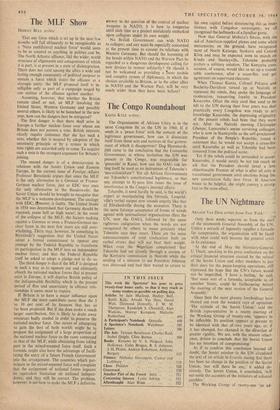The MLF Show
HEDLEY BULL writes:
That any force which is set up in the next few months will fail ultimately to be recognisable as a 'Nato multilateral nuclear force' would seem to be as assured as anything in politics can be. The North Atlantic alliance, like the wider, world structure of alignments and antagonisms of which it is part, is at present in a state of disintegration. There does not exist among the allies a wide and lasting enough community of political purpose to sustain a force which treats the alliance as a strategic unity; the MLF proposal itself is in- telligible only as part of a campaign waged by one section of the alliance against another.
Assuming, however, that whether the British remain aloof or not, an MLF involving the United States, Western Germany and possibly several others, is likely to be launched in the new year, how can the dangers best be mitigated?
The first danger is that there shall arise in Europe a further nuclear force over whose use Britain does not possess a veto. British interests clearly require insistence that she has such a veto, whether this is secured by adoption of the unanimity principle or by a system in which veto rights are accorded only to some. To acquire such a veto is the strongest argument for Britain's joining.
The second danger is of a deterioration in relations with the Soviet Union and Eastern Europe. In the current issue of Foreign Affairs Professor Bzrezinski argues that since the MLF is tb,e only alternative to a German or Franco- German nuclear force, just as EDC was once the only alternative to the Bundeswehr, the Soviet Union should be brought to recognise that the MLF is a welcome development. The analogy with EDC, lfbwever, is faulty. The United States in 1954 was determined that Germany should be rearmed, come hell or high water; in the event of the collapse of the MLF, the factors making against a German or even a Franco-German nu- clear force in the next few years are still over- whelming, There may, however, be something in Bzrezinski's suggestion that the United Statet adopt a formal commitment to oppose any attempt by the Federal Republic to transform its participation in the MLF into an independent nuclear force; and that the Federal Republic itself be asked to adopt a pledge not to do so.
The third danger is that if the MLF is designed in such a way as to squeeze out and ultimately absorb the national nuclear forces that at present exist in Europe, it will deprive British policy of the indispensable flexibility which in the present period of flux and uncertainty in alliance rela- tionships it seems most to require.
If Britain is to have a major influence upon the MLF she must contribute more than the 5 to 10 per cent of its finances that has so far been projected. But if she does make a much larger contribution, this is likely to drain away resources badly needed in order to preserve the national nuclear force. One means of attempting to gain the best of both worlds might be to propose the assignment of a large proportion of the national nuclear force to the same command as that of the MLF, while abstaining from taking part in the mixed-manned force itself. Such a formula might also have the advantage of facili- tating the entry of a future French Government into the arrangement. The countries which par- ticipate in the mixed-manned force will complain that the assignment of national forces imposes no equivalent limitation on national indepen- dence; and they will be correct. The problem, however, is not how to make the MLF a definitive
answer to the question of the control of nuclear weapons in NATO; it is how to temporise until such time as a project mistakenly embarked upon collapses under its own weight.
No British Government can wish NATO to collapse; and any must be especially concerned at the present time to cement its relations with Western Germany. But should the loosening of the bonds within NATO and the Warsaw Pact be regarded as a dangerous development calling for new devices to restore solidarity? Or should it not be welcomed as providing a 'More mobile and complex system of diplomacy, in which the choices available to Britain, as to the other allies in NATO and the Warsaw Pact, will be very much wider than they have been before?


































 Previous page
Previous page